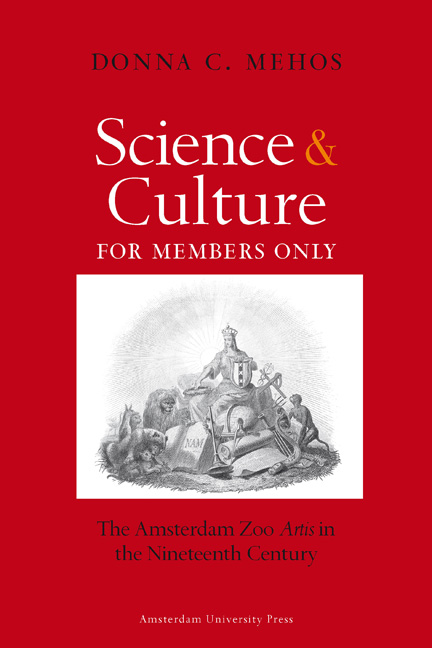Book contents
- Frontmatter
- Dedication
- Contents
- Acknowledgments
- Introduction The Nation and Nature in Middle-Class Culture
- Chapter 1 Structuring a New Generation’s Scientific Society
- Chapter 2 Private Science and the Public Interest
- Chapter 3 Internationalizing Nationalist Science
- Chapter 4 Science Joins Cultural Life
- Conclusion Science, Colonial Expansion, and National Identity
- Appendix: Members of the Artis Board of Directors, 1838-1870
- Notes
- List of Illustrations and Color Plates
- Bibliography
- Index
- Plate Section
Conclusion Science, Colonial Expansion, and National Identity
Published online by Cambridge University Press: 20 January 2021
- Frontmatter
- Dedication
- Contents
- Acknowledgments
- Introduction The Nation and Nature in Middle-Class Culture
- Chapter 1 Structuring a New Generation’s Scientific Society
- Chapter 2 Private Science and the Public Interest
- Chapter 3 Internationalizing Nationalist Science
- Chapter 4 Science Joins Cultural Life
- Conclusion Science, Colonial Expansion, and National Identity
- Appendix: Members of the Artis Board of Directors, 1838-1870
- Notes
- List of Illustrations and Color Plates
- Bibliography
- Index
- Plate Section
Summary
The hundreds of burghers who attended G.F. Westerman's funeral in 1890 mourned the loss of “the soul of the Society.”1 Artis, however, had already entered its decline although it was not a direct result of Westerman's death. In their efforts to elevate the status of their nation and its capital, the Dutch burghers who financed Artis, and later the Concertgebouw and the Rijksmuseum, created new forms of cultural life that ultimately made Artis seem outmoded. In the course of his long life, which spanned most of the nineteenth century, Westerman and his contemporaries were motivated by both the civic and national loyalties that transformed Dutch culture (see color plate 6).
Science, Art, and National Identity
At Artis, the Dutch consciously created a scientific cultural institution that expressed a future-oriented national identity. Rather than inventing heroic myths about seventeenth-century figures such as Leeuwenhoek, Boerhaave, and Huygens, the founders and supporters of Artis had a vision in which scientific advancement would elevate the status of their nation. Artis, having achieved prominence as a cultural institution, embodied the national and civic allegiances of its members. In the decade marked by Artis's founding (1838) and the War of Belgian Secession (1830), a wave of nationalism washed over the Netherlands, coupled with a sense of despair over the decline of a (potentially) great nation. National pride and despondency characterized the 1830s and 1840s. If the founders and supporters of Artis in its first decade subscribed to a view of their nation's decline, they were not fixated on it.
Unlike the Rijksmuseum, Amsterdam's zoological society was not inspired by heroes from the Golden Age, and it did not invoke images of geniuses from Holland's past. Rather, Artis looked ahead as it developed into a new type of scientific institution that would be validated only when it earned a reputation in the international scientific arena. Early in its history, the Artis directorate understood that science was measured by international standards. The Dutch who fostered science expressed nationalist sentiments and developed their national identity by looking forward to scientific advances and outward for international legitimation of their national sciences. In contrast, scholars have identified inward-focused nationalism coupled with a veneration of the past as principal factors in the process of national identity formation.
- Type
- Chapter
- Information
- Science and Culture for Members OnlyThe Amsterdam Zoo Artis in the Nineteenth Century, pp. 125 - 130Publisher: Amsterdam University PressPrint publication year: 2006



